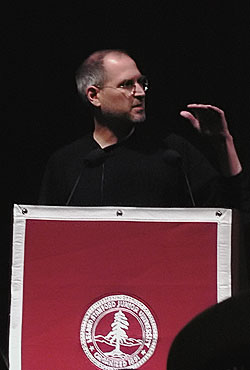
It’s coming. The ‘annual’ MWSF Keynote, presented, as it has been the case for ten years now, by Steve Jobs, Apple’s current CEO and co-founder, the man who’s widely considered to have turned it around after the ‘dark ages’ of the mid-90s is eagerly awaited by millions of Apple {fans, users, stockholders} all over the globe. Yet despite stellar (and accelerating) growth, many have wondered whether Apple would cope without Jobs at its helm. For a major crisis might be looming for Apple if the SEC investigation finds that Jobs’ involvement with the stock-option ‘scandal’ is significantly great to warrant his removal from the CEO position.
And it is a daunting, yet very probable possibility despite Apple’s recent self-exoneration. Or rather, it seems to me that the departure of Rubinstein, Tevanian and more recently (and most importantly) Apple’s CFO Anderson in early to mid 2006 and the speed with which Apple has concluded that Jobs is not involved, are suspicious and might hint of the seriousness of the situation.
So in the — hopefully unlikely — event that Jobs (is forced to) resign(s) what would the future hold for Apple? Would his departure signify a return to the chaos of the post-Sculley, pre-Jobs era? The accompanying lack of focus, the financial struggle, the bleak predictions?
Probably not. At least not straightaway. Apple is a company at a very different state of being now to what it was in the mid 1990s. The iPod is still a huge money-maker and will probably continue to be so for a few more years. Jobs’ departure, if anything, would probably not affect immediate sales or Apple’s product line for the next one or two years. Mac OS X is still ahead of the competition in many areas and the current and (most probably already designed) next-gen Macintosh computers are great machines, despite their problems. The Macintosh is going through a renaissance that the Intel switch has accentuated these past 12 months.
Yet Jobs departure from Apple is bound to affect the long-term development of the company as well as some short-term metrics. It’s not just the lack of focus, the change of culture, the feeling of loss, trust and morale among the Apple-folk. It doesn’t have to be as ‘romantic’ or ‘naive’ as that. His departure might significantly affect Apple’s ongoing research and product development if it carries with it many of Apple’s lifeblood: engineers, executives, marketers. He does have a tendency to take with him many of his subordinates. He did so in 1985 when he left Apple to found NeXT. He might do so again, although I don’t think Steve Jobs would start a new computer company now if he left Apple. It would most certainly cause a major stock hit, market instability and might marginally harm Macintosh sales. It would most certainly arm Apple’s enemies with enough ammunition to hit it harder than ever and it might destabilise the fragile alliances Apple has made and is pursuing with the music and movie industries.
Still, it’s too early to be definitive about any of this. I sense that there’s disaster waiting to happen and tomorrow’s two hour keynote might also include a “farewell” instead of “one more thing”, although that’s quite unlikely. Even if Steve Jobs is in trouble, which I think he is bound to be at some level, this does not necessarily mean that he’ll have to resign his CEO post or leave Apple. He might still stay on at Apple as a board member or ‘special’ consultant. The possibility of his departure and a potential new dark era for Apple and by extension the Macintosh is very real although, despite the noise, few have been vocal about it. I hope I’m wrong about the seriousness of this, but I find solace in the fact that even if Jobs is to resign, even if the Apple board is removed and replaced, Apple is a stronger, more powerful player today than it was ten years ago and this can only help it redefine itself in the post-Jobs era.
Image © 2005 juvertson. Licensed under Creative Commons 2.5 Attribution Licence. Original image can be found here.
